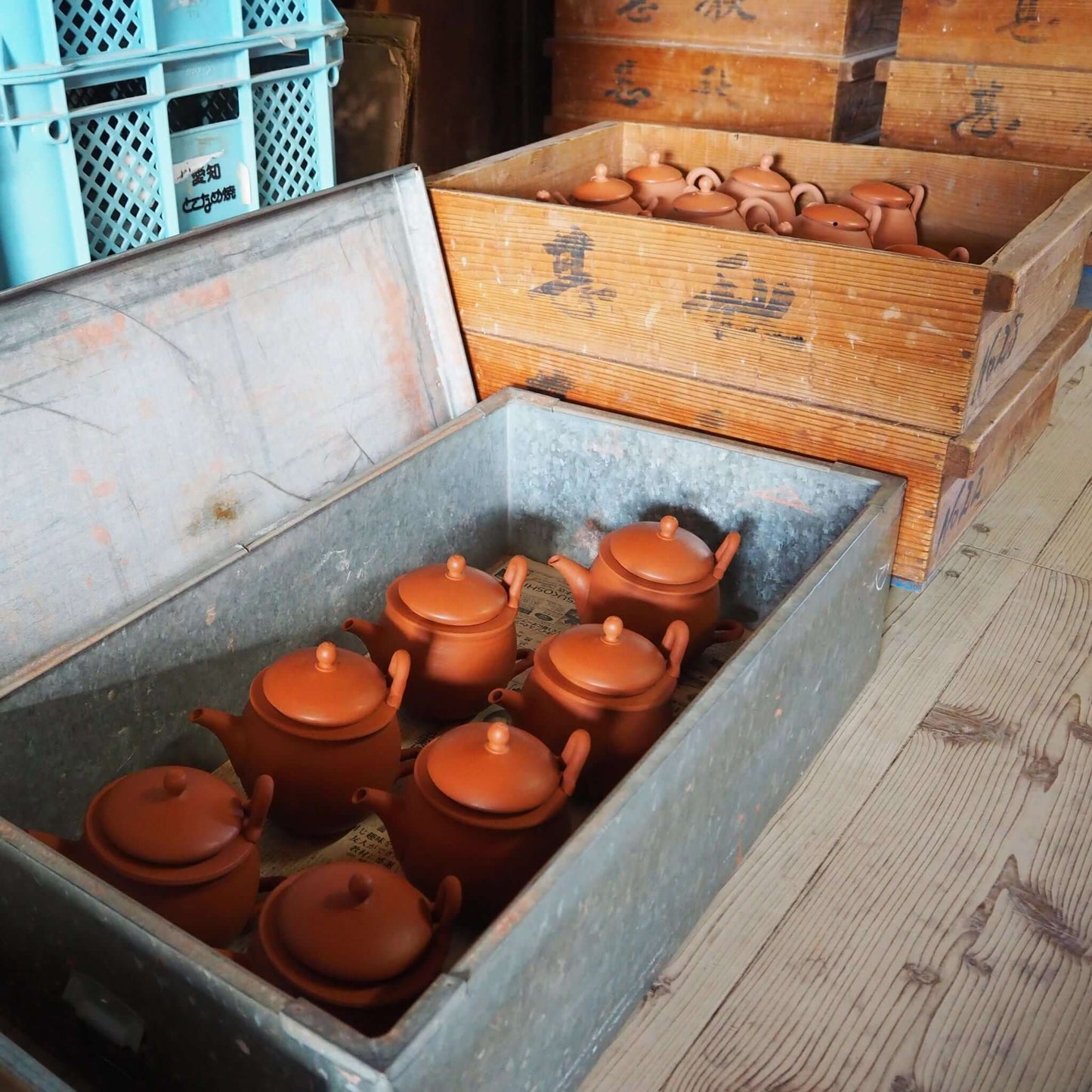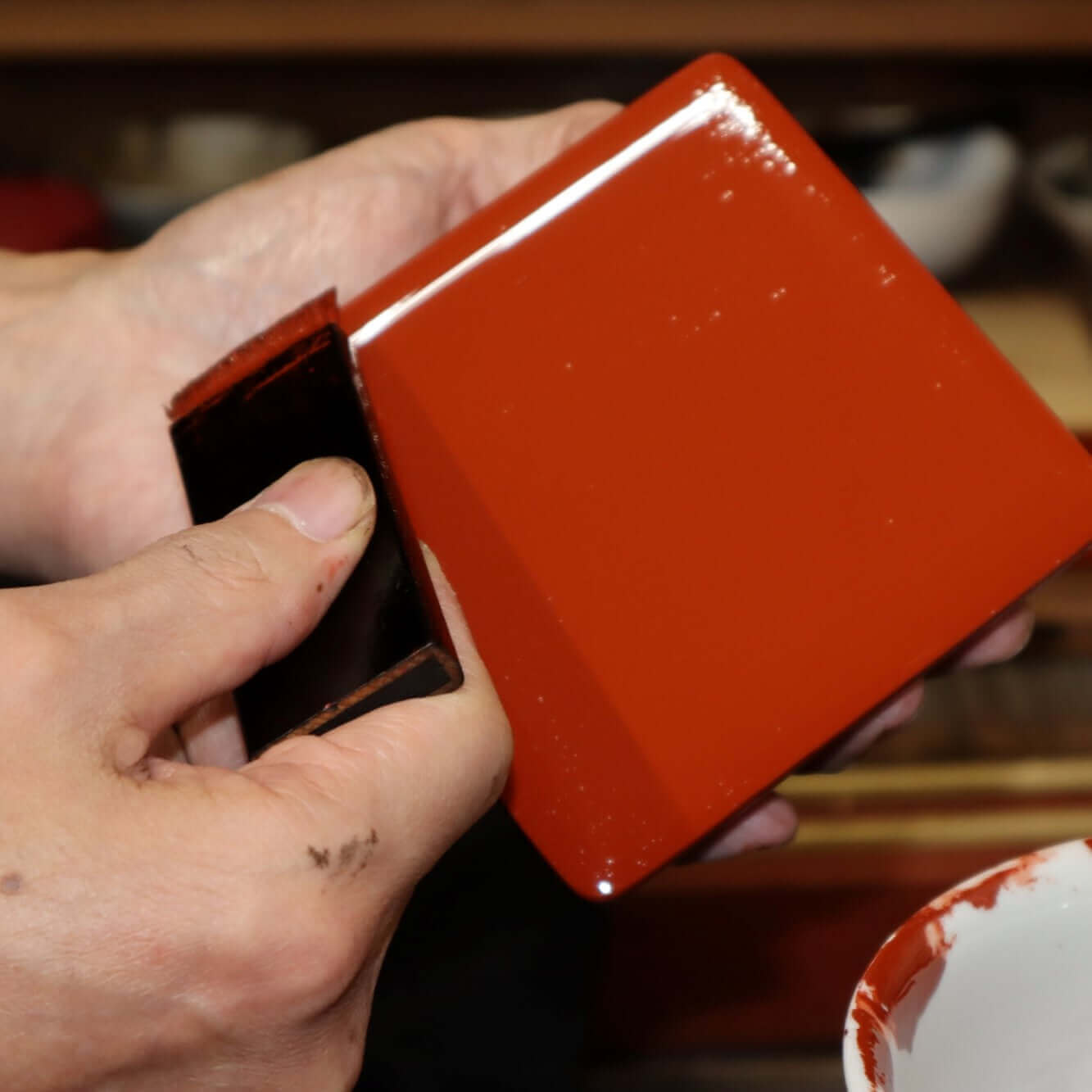煎茶 中国茶 台湾茶向け 日本製急須/茶壺専門店 東山堂
Teapot set (red clay pentagonal teapot X deer flower bird pattern silk pouch)
Teapot set (red clay pentagonal teapot X deer flower bird pattern silk pouch)
Teapot set of Tokoname red ckay Arashi-shibori teapot with a teapot pouch with a pattern of deer, flowers, and birds, and a red lacquer box.
<Teapot>
Potter: Jinshu Toen (Tokoname ware atelier)
Firing: Electric furnace
Size: Total length 12cm (including handle and mouth), body (longest) 8cm, height 8.5cm
Capacity: 180ml
Weight: Approx. 130g
Ingredients: Tokoname red clay
Note: The seal between the lid and the body is good.
<Tokoname ware>
Tokoname ware is a type of pottery made in Tokoname City, Aichi Prefecture. During the Middle Ages, it was Japan's largest ceramic production area, and in addition to daily necessities such as plates, bowls, and pots, it also produced large pottery such as jars and pots.
From the end of the Edo period (around 1858 AD), red clay tea utensils and sake utensils were also made. Since the mid-Showa era (1962 AD), electric furnace technology for red clay has been established.
There are clays suitable for teapots, such as red clay and black clay, and the techniques used to make teapots are extremely high. It is Japan's largest teapot production area.
<Teapot pouch>
Artisan: Syusai (traditional pouch atelier)
Fabric: Deer flower bird maru pattern (Shika Kaki Tori Marumon)
Size: Width approx. 12cm Height approx. 10cm
Weight: Approx. 20g
Materials: Outer fabric, lining fabric, braided cord 100% silk
<lacquered box>
Artisan: Ootoshi Lacquerware Store (Echizen Lacquerware)
Size: Length 10.8cm Width 10.8cm Height 11.5cm
Weight: Approx. 230g
Materials: Lid: Chinese plywood / Body: Hiba wood / Coating: Natural lacquer
Notes: red lacquer coated (only the outer bottom is black coated)
As it is a natural lacquer, the color will lighten over the years as it ages.
Couldn't load pickup availability
Low stock: 1 left
View full details



















FAQ
Which type of of tea can I brew with the teapot?
It can be used for any type of tea. However, unglazed pottery is more likely to absorb the flavor of the tea leaves. By using different tea utensils for each type of tea, you can enjoy the flavor of the tea to the fullest.
For example, in the case of Japanese tea, sencha, fukamushicha, genmaicha, and gyokuro are all in the same family, but since hojicha has a strong roasted aroma, we recommend using a different tea utensil.
However, glazed pottery or porcelain tea utensils do not absorb the flavor of the tea leaves, so they are suitable for brewing various types of tea.
How do you wash a teapot?
Please wash the teapot with water, without using detergent. Ceramic teapots easily absorb detergent ingredients, which can affect the flavor of the tea.
Tea leaves remaining in the teapot are the main cause of tea stains. After brewing tea, we recommend removing the tea leaves once they have cooled and rinsing them with water.
Moisture remaining in the teapot can cause mold. Turning the teapot upside down will help it dry faster.
We do not recommend washing it in the dishwasher. Please wash by hand.
Can I remove tea stains from a teapot?
Here's how to remove tea stains.
1. In a bowl or pot, mix 24g of baking soda with 1 liter of water at 30-40°C.
*Do not use aluminum or Teflon-coated pots as they will react with baking soda.
2. Leave the teapot in the water mentioned in step 1 for 30-60 minutes.
3. Wipe off the tea stains with a soft sponge or cotton swab. Do not use hard sponges or brushes.
4. Rinse the teapot with water.
5. Thoroughly dry the teapot.
*Baking soda water may irritate your hands, so wear rubber gloves.
Can I return the product?
We do not accept returns unless the product is damaged when the package arrives.
Each tea utensil is slightly different and may have slight distortions or scratches. Please check the images posted on our online shop in advance.
If you have any questions about the detailed condition of the product, please feel free to contact us. We can send you additional images and videos of the product.
Do you ship internationally?
We can ship to the following countries:
China, Hong Kong, Macau, Taiwan, South Korea, Singapore, Malaysia, Indonesia, Thailand, Vietnam, Philippines
Are the goods antiques or second-hand goods?
All the products in the shop are new. We sell products produced by potters and kilns in Japan.




















